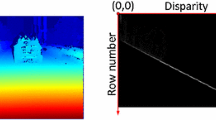Abstract
An embedded system is developed to segment stereo images using disparity. The recent developments in the embedded system architecture have allowed real time implementation of low-level vision tasks such as stereo disparity computation. At the same time, an intermediate level task such as segmentation is rarely attempted in an embedded system. To solve the planar surface segmentation problem, which is iterative in nature, our system implements a Segmentation–Estimation framework. In the segmentation phase, segmentation labels are assigned based on the underlying plane parameters. Connected component analysis is carried out on the segmentation result to select the largest spatially connected area for each plane. From the largest areas, the parameters for each plane are reestimated. This iterative process was implemented on TMS320DM642 based embedded system that operates at 3–5 frames per second on images of size 320 × 240.
Similar content being viewed by others
References
Altunbasak Y., Tekalp A., Bozdagi G.: Simultaneous motion-disparity estimation and segmentation from stereo. IEEE Int. Conf. Image Process. 3, 73–77 (1994)
Besag J.: On the statistical analysis of dirty pictures. J. R. Stat. Soc. B (Methodological) 48(3), 259–302 (1986)
Burschka, D., Hager, G.: Scene classification from dense disparity maps in indoor environments. In: 16th International Conference on Pattern Recognition, vol. 3, pp. 708–712 (2002)
Corso, J., Burschka, D., Hager, G.: Direct plane tracking in stereo image for mobile navigation. In: International Conference on Robotics and Automation (2003)
Ding Y., Ping X., Hu M., Wang D.: Range image segmentation based on randomized hough transform. Pattern Recognit. Lett. 26(13), 2033–2041 (2005)
Granston, E.: Hand-tuning loops and control code on the TMS320C6000. Tech. rep., Texas Instruments (2006). http://focus.ti.com/lit/an/spra666/spra666.pdf
Haralick R.M., Shapiro L.G.: Computer and Robot Vision. Addison-Wesley Longman Publishing Co. Inc., Boston (1992)
Harris, C., Stephens, M.: A combined corner and edge detector. In: The Fourth Alvey Vision Conference, Manchester, pp. 147–151 (1988)
Hartley R.I., Zisserman A.: Multiple View Geometry in Computer Vision,2nd edn. Cambridge University Press, Cambridge (2004)
Hoover A., Jean-Baptiste G., Jiang X., Flynn P.J., Bunke H., Goldgof D.B., Bowyer K., Eggert D.W., Fitzgibbon A., Fisher R.B.: An experimental comparison of range image segmentation algorithms. IEEE Trans. Pattern Anal. Mach. Intell. 18(7), 673–689 (1996)
Izquierdo E.: Disparity/segmentation analysis: matching with an adaptive windowand depth-driven segmentation. Circuits Syst Video Technol IEEE Trans 9(4), 589–607 (1999)
Kanazawa, Y., Kawakami, H.: Detection of planar regions with uncalibrated stereo using distribution of feature points. In: British Machine Vision Conference, London, vol. 1, pp. 247–256 (2004)
Kehtarnavaz, N.: Real-Time Digital Signal Processing: Based on the TMS320C6000. Newnes, Oxford (2004)
Konolige, K.: Small vision system: Hardware and implementation. In: Eighth International Symposium on Robotics Research (1997)
Li S.Z.: Markov Random Field Modeling in Computer Vision. Springer, London (1995)
Mühlmann K., Maier D., Hesser J., Männer R.: Calculating dense disparity maps from color stereo images, an efficient implementation. Int. J. Comput. Vision 47(1), 79–88 (2002)
Middlebury Stereo Vision Page. http://www.middlebury.edu/stereo
Molton N., Se S., Brady J., Lee D., Probert P.: A stereo vision-based aid for the visually impaired. Image Vision Comput. 16, 251–263 (1998)
Okada K., Kagami S., Inaba M., Inoue H.: Plane segment finder: algorithm, implementation and applications. IEEE Int. Conf. Rob. Autom. 2, 2120–2125 (2001)
Qureshi S.: Embedded Image Processing on the TMS320C6000 DSP. Springer, Berlin (2005)
Klette R., Schlüns K.A.K.: Computer Vision: Three-Dimensional Data from Images. Springer, Berlin (1998)
Schindler, K., Suter, D.: Two-view multibody structure-and-motion with outliers through model selection. Pattern Anal. Mach. Intell. IEEE Trans 28(6), 983–995 (June 2006). doi:10.1109/TPAMI.2006.130
Se, S., Brady, M.: Stereo vision-based obstacle detection for partially sighted people. In: Third Asian Conference on Computer Vision, pp. 152–159. Springer, London (1997)
Shi, J., Tomasi, C.: Good features to track. In: IEEE Conference on Computer Vision and Pattern Recognition, Seattle (1994)
Sinclair D., Blake A.: Quantitative planar region detection. Int. J. Comput. Vision 18(1), 77–91 (1996)
TMS320C6000 Programmer’s Guide (Rev. I). Texas Instruments (2006). http://focus.ti.com/lit/ug/spru198i/spru198i.pdf
TMS320C64x/C64x+ DSP CPU and Instruction Set Reference Guide (Rev. C). Texas Instruments (2006). http://focus.ti.com/lit/ug/spru732c/spru732c.pdf
TMS320C64x Image/Video Processing Library Programmer’s Reference. Texas Instruments (2003). http://focus.ti.com/lit/ug/spru023b/spru023b.pdf
Triggs, B.: Autocalibration from planar scenes. In: 5th European Conference on Computer Vision, pp. 89–105. Springer, London (1998)
Trucco, E., Isgro, F., Bracchi, F.: Plane detection in disparity space. In: International Conference on Visual Information Engineering, pp. 73–76 (2003)
Tyzx Inc. http://www.tyzx.com/
Tzovaras D., Grammalidis N., Strintzis M.G.: Joint three-dimensional motion/disparity segmentation for object-based stereo image sequence coding. Opt. Eng. 35, 137–144 (1996)
Valde systems. http://www.valdesystems.com/
Videre Design. http://www.videredesign.com/
Wang X., Wang H.: Markov random field modeled range image segmentation. Pattern Recognit. Lett. 25(3), 367–375 (2004)
Zucchelli, M., Santos Victor, J., Christensen, H.: Multiple plane segmentation using optical flow. In: British Machine Vision Conference, pp. 313–322 (2002)
Zuliani M., Kenney C., Manjunath B.: The multiransac algorithm and its application to detect planar homographies. IEEE Int. Conf. Image Process. 3, 153–156 (2005)
Author information
Authors and Affiliations
Corresponding author
Rights and permissions
About this article
Cite this article
Thakoor, N., Gao, J. & Jung, S. Embedded planar surface segmentation system for stereo images. Machine Vision and Applications 21, 189–199 (2010). https://doi.org/10.1007/s00138-008-0147-x
Received:
Revised:
Accepted:
Published:
Issue Date:
DOI: https://doi.org/10.1007/s00138-008-0147-x




